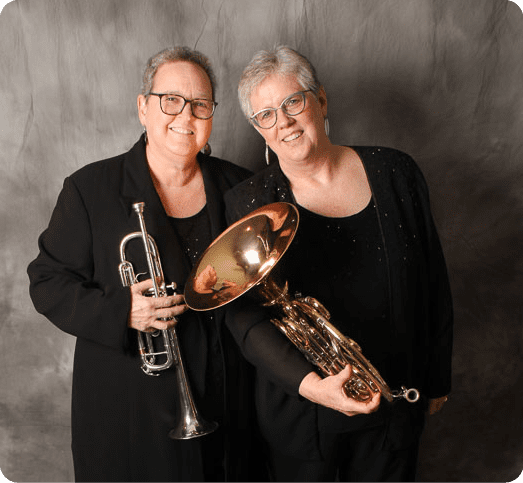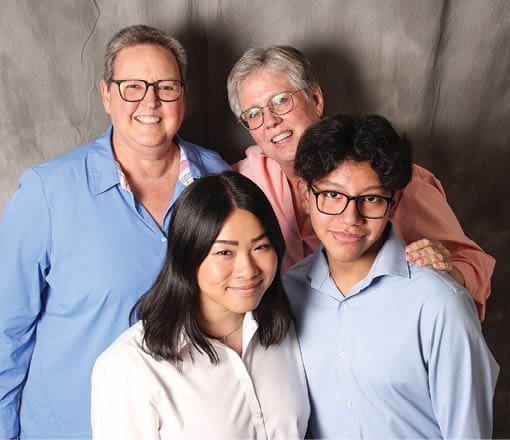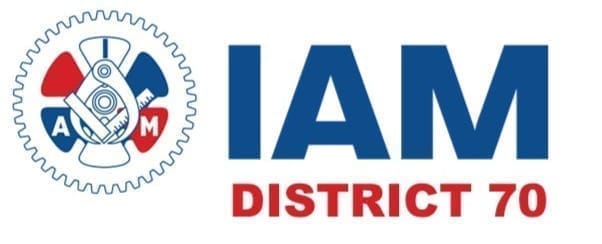Pride Month Profiles: Houston Brass-Playing Couple Share a Life in Music

For Pride Month, the AFL-CIO is spotlighting various LGBTQ+ Americans who have worked and continue to work at the intersection of civil and labor rights.
When two of Houston’s busiest brass players, who also happen to be a couple, want to share some downtime together, it can sometimes require comparing calendars. It’s a scenario that will be familiar to just about every musician couple anywhere.
Nancy Goodearl, a horn player with the Houston Symphony since 1981, won the job after studying at the Eastman School of Music and Northwestern University. Goodearl’s wife, Theresa Hanebury, has played trumpet with the Houston Ballet for nearly the same number of years. After two decades together, they’ve settled on a routine that mostly works, despite the fact that their schedules are quite different.
Goodearl and Hanebury are members of Local 65-699 (Houston). Both grew up in New England, an hour away from each other—but they never met until landing in Houston. “I can’t even remember the exact time we met,” Hanebury said. “We of course knew of each other since we work in two different orchestras a block apart. But it wasn’t until the late ’90s that we actually got to know each other.”
Early Start
Both started music in elementary school. Goodearl ended up on her instrument as many horn players do, wanting to join her high school band because her older siblings played instruments and it looked like fun—and then the band director handed her a horn. “It stuck,” she said. “From that point, there was never really any question what I wanted to do with my life.”
Hanebury began on the trumpet in third grade. “They showed us all the band instruments, and I got really excited about one in particular,” she remembered. “My mom asked me to show it to her, so I ran to the encyclopedia and looked up the clarinet. After some confusion, I realized that wasn’t it,” she laughed. “So we looked up the cornet. That was it.”
Goodearl always knew she wanted to play in an orchestra and pursued performance degrees. Hanebury, perhaps a bit more pragmatic, got a degree in music education at the University of Hartford. “I figured I could always play the trumpet with a teaching degree,” she said. “The opposite is not always true.”
While Hanebury was playing in the Sarasota Music Festival, a colleague told her about a wealth of teaching opportunities in Houston. “Three weeks later, I moved there and had 50 students in my first year.” She also won several auditions for trumpet positions in the city and has been with the Houston Ballet since 1983.
Outside Activities
While their orchestra jobs keep them quite busy, both Goodearl and Hanebury stay active in other areas, together and independent of one another, which they say helps to balance their personal lives on and off the job. Outside of music, Goodearl is a skilled potter, with her own pottery wheel and kiln. “I also do some crafty things,” Hanebury added, not wanting to be left out. “We take any time we can find to go fishing and kayaking.”
Teaching has always figured prominently, and both understand the importance of music education and passing along what they’ve learned. Goodearl served on the faculty of the University of Houston for 20 years, while Hanebury has taken a break from teaching as a result of the COVID-19 pandemic and health issues. “I had a bone marrow transplant last August, so I’m just waiting for things to be a bit safer before I go back to working with students,” she explained.
Goodearl and Hanebury each perform extensively in small ensembles across the Houston area and also play with the Monarch Brass Ensemble, an all-female brass group made up of women from across the country and affiliated with the International Women’s Brass Conference (IWBC). Both women have served on the IWBC board. “An IWBC conference is actually where we got to know each other,” Hanebury added.
Since the ballet is not a full-time salaried job, Hanebury fills her time with freelancing. For the past decade, she has also been the Houston Ballet’s music librarian and pianist manager. “I wear many hats, but one of the things that keeps me busy these days is contracting,” she said. “I hire musicians for everything from local shows to churches and schools.”
Union Rules
The contracting has given the couple a greater understanding of how the union works and how it benefits its members. “I’ve been a member of the Houston local since I started working here, and as such, a beneficiary of the Houston Symphony’s contracts,” Goodearl said. “I’m grateful to have this as a direct result of being a union member.” One such benefit is the Music Performance Trust Fund’s Music Family Scholarship, which their daughter has received for two years.
Hanebury’s union dealings are a bit more hands-on. “I’ve learned a lot about writing union contracts during my years of hiring,” she said. “So much so that people now call me to learn how to do it, and I’ve taught a lot of the other contractors in town.”
Hanebury added that she knows everyone at the Houston local and on the local board, and has served on negotiating committees at the Houston Ballet, which has given her a deeper understanding of how to work with a lawyer—another benefit of being a union member.
Asked if they have opportunities to work together, Hanebury laughed heartily. “Our schedules are just so different, so there’s not much overlap. But I do try to hire Nancy when I contract. Not because we’re married, but because, you know, she’s pretty good.”
Family Life
The couple got married in 2015 in Massachusetts, “just a few months after same-sex marriage became legal,” Goodearl said. Even back then, finding time together was a challenge. “We would try to do a date night with rules that stipulated we couldn’t talk about work.” As if life hadn’t been busy enough, they adopted two children. “After that, date night morphed into no talking about work or the kids.”
Angela, now 21, was adopted from China and is now in college. John, 18, is Guatemalan and about to graduate from high school. “I always wanted kids but never thought it was possible,” Goodearl said. “But we met some gay couples that had successfully adopted children from China, and they helped us realize it was possible.”
“Having kids definitely changed some of the goals we may have had, professionally,” added Hanebury, who says she was still taking auditions at the time. But she is quick to add that she wouldn’t change a thing. “After the second kid goes off to college, everything will change again. It’s going to be a big adjustment.”
Both concede, however, that finding time to spend together might become just a bit easier. “For starters, we hope to play together more after the kids are gone,” Hanebury continued. “It was tough when they were little, coordinating babysitters. The kids got used to us not being home. Holidays were especially challenging, because we typically play at church services, so they grew up having holidays with friends. They understood and got used to quick Christmas presents in the morning, and then we went off to work!”
Pride—and Acceptance
Goodearl and Hanebury are gratified to share their story during Pride Month. “We feel that Pride is about acceptance,” Goodearl said. “We know we have an unusual family, but we are, in the end, a family, with all that includes. We appreciate the freedom to be who we are.”
She added that both children included the family’s story of diversity in their college entrance essays. “They’ve had to go through some challenges in their lives. When they were younger, for instance, we couldn’t both drop them off at school. But they embraced the diversity, and they understand that it made them stronger.”
“I swear we’re always working when the Houston Pride Parade is going on,” Hanebury laughed. “But we are who we are, we live our lives and we have our family. We’re very grateful.” She said they have obviously met people over the years who are against who they are and how they live their lives. “For the most part, though, anyone we’ve encountered has been wonderful and accepting. And Pride Month is, in the end, a celebration of acceptance and of honoring those who came before us and made it easier for us all.

This post originally appeared at International Musician, the official journal of the American Federation of Musicians.
Kenneth Quinnell
Mon, 06/27/2022 – 12:47
